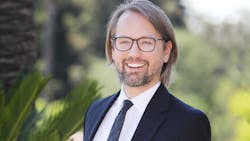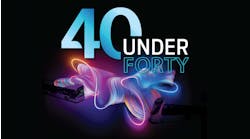One word to describe yourself: Curious
Alma Mater: NYU and Columbia University
Fun fact about yourself: I was a Maryland state champion in extemporaneous speaking in high school.
Andrew Quinn joined L.A. Metro in 2015 as a senior environmental specialist and has continually contributed to the improvement of the agency as he’s risen through the ranks. He was promoted to senior manager in 2019 and then served as interim senior director in 2021. In his time in the Environmental Compliance and Sustainability Department, Quinn worked on many successful projects to further sustainability efforts at the agency. Quinn planned and managed the expansion of L.A. Metro’s EV charger program from 20 to 100 chargers, including piloting the electrification of L.A. Metro’s non-revenue fleet. He mentored staff in learning new technical, financial and legal skills, and organized training sessions for staff to develop a greater understanding of zero-emission bus technologies, project delivery methods, financial analysis and contract structuring. In addition to the EV charge program, he developed a triple bottom line analysis tool currently in use on projects and worked on the sustainability capital program.
Since moving to his current role as deputy executive officer for L.A. Metro’s Office for Strategic Innovation, he has been instrumental in several projects. He led the value for money analysis for the East San Fernando Valley Transit Corridor light-rail transit project; supported the development of the Sepulveda Pre-Development Agreement (PDA); and oversaw the development of Early Works and Public Private Partnership delivery methods for the West Santa Ana Branch light-rail transit project. He then led the partnerships team in preparing business cases for the Sepulveda, West Santa Ana Branch and Zero Emission Bus projects and coordinating L.A. Metro’s involvement in the Inglewood Transit Connector automated people mover project.
Most notably, Quinn was instrumental in developing the Sepulveda PDA, a first of its kind competitive PDA enlisting two private sector teams to design heavy rail and monorail transit solutions for the Sepulveda Transit Corridor project. The teams are competing to be selected by L.A. Metro as the locally preferred alternative and the opportunity to build, finance, operate and maintain the transit line. His work focused on the development of the scope of work and its relationship to the CEQA/NEPA environmental processes and value for money evaluation process, PDA evaluation criteria and PDA compensation structure. During the active procurement process, he worked collaboratively to receive feedback from PDA proposers and revise the PDA RFP and PDA agreement to ultimately attract four proposals. He is currently leading the financial workstream and value for money analysis to fulfill the requirements of the Infrastructure Investment and Jobs Act and to recommend the best delivery method for the project.
He actively engages firms in structured market soundings to receive feedback on L.A. Metro’s proposed projects and contract terms and conditions in order to develop commercially attractive and competitive projects that meet L.A. Metro’s goals and objectives. Andrew has led several market sounding efforts by engaging large construction, engineering and equity firms to share lessons learned, market insight, and solicited their input on projects under development. These market sounding efforts have assisted Metro in developing project strategy, solicitation and contract framework, and informed the Agency on industry best practices.
He is supporting the development of the California Infrastructure Delivery Coalition (CALInfra), a non-profit organization focused on educating and informing state and local governments and transit agencies on the various forms of project delivery and advocating for the authority to allow them to utilize any form of project delivery they determine is most appropriate for meeting their goals and objectives. He also speaks at multiple conferences and works with peers at other agencies such as Maryland DOT, New Jersey Transit and Canada Infrastructure Bank to exchange best practices on project delivery methods and how they can help improve transit service delivery.
What do you enjoy most about your job?
Working on so many different aspects of the business. Leading L.A. Metro’s Partnerships team, I get to engage and work with engineers, architects, construction managers, contractors, lawyers, investors, financial, asset and procurement managers, operators, track inspectors, politicians, residents, etc. Everyone has a unique and valuable perspective.
What’s the most challenging part of your job?
I love collaborating with and learning from people with very different perspectives and expertise, but it can be a challenge to achieve consensus on a single issue or project. Invariably almost every solution comes with a cost. Even if the net benefits outweigh the costs, an aspect of the project may suffer and the individual or team responsible for that portion of the project may have a hard time accepting the overall solution. Finding that balance of multiple perspectives and interests to achieve the best outcomes for a project, the agency and the region is a process requiring patience, persistence and open-mindedness.
Accomplishment you’re most proud of and why?
Being a part of the team that developed the Sepulveda Pre-Development Agreement. First of all, the people have been a delight to work with. And figuring out how to structure the procurement and the contract to ensure innovative competition, to protect L.A. Metro’s and taxpayers’ interests, and to enable a collaborative environment between L.A. Metro and its contractors was an incredibly fascinating puzzle to piece together. Now working through the implementation with L.A. Metro staff, the PDA teams and our technical, environmental, outreach, financial and legal advisors is very gratifying too. It’s a constant learning process. Key insight so far: a contract is one of the most powerful tools for internal organizational change.
Best advice/tip/best practice to share from your area of expertise?
Start by asking yourself the questions: what are the outcomes I want to achieve? What’s the process to get there? Then focus on the process and recognize and accept what you can’t (and shouldn’t!) control.




